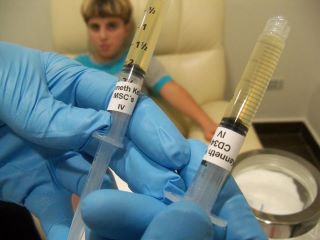FOR IMMEDIATE RELEASE...June 18, 2010
Autistic Child Reading After Stem Cell Treatment
BANGOR, MAINE--A Bangor child, who received a stem cell infusion for Autism last year, is now reading, thanks to his new stem cells. Nine year old Kenneth Kelley was the first in Maine--and one of less than a hundred nationwide--to be treated with adult stem cells from umbilical cord blood to help him recover from Autism. He will go back in July to receive more stem cells.
The trestment has been a huge success. Kenneth is now able to read. "One day this spring, he just picked up a book and started reading." says Marty Kelley, Kenneth's mom. His improvements since the treatment are as follows:
1.) Able to read at the beginner level
2.) More cognition
3.) More abstract thinking
4.) Talks about past events/people who have died
5.) Prays to God to help him when he is out of control
6.) Knows birthdays, what day of the week it is, what date it is, what time it is
7.) Better sentence structure
8.) Clearer speech
9.) Can do math problems/addition, can write simple sentences
10.) More awareness
11.) More conversational speech
12.) Potty trained
The Kelley's have been treating Kenneth for autism with biomedical intervention. He began mild hyperbaric oxygen therapy in the home three years ago. "700 hours later and with fantastic results from that, we were ready to take the next step". Kelley, after much research, came across Adult Stem Cell therapy. A simple way to understand this therapy is that it does much the same types of things as mHBOT, but at a much faster rate. The stem cells go in to the body, find the damaged areas, and begin to form new working blood vessels that carry oxygen and rejuvenate the damaged tissues.
As a mom of an autistic child, Kelley is driven by curiosity about what caused her son to have this condition. For the last three years, she has been studying biomedical interventions and using parent based online-forum analysis to uncover the reasons for his autism. As a result, her son has improved tremendously in cognition and development. Kelley tries to be up to speed on traditional and new-millennium research tools and approaches based on research. She says, "I am fanatical about understanding autism, what is causing it, and how to help combat it better every day, week, and month."
It is this drive that caused her to find two stories of autistic children who have been to Costa Rica for this same treatment. These children, like Kenneth, are almost recovered.
Stem cell therapy is the use of adult stem cells to treat certain diseases. The stem cells are derived from the patient's own blood, bone marrow and/or fat. In general terms, stem cells are progenitor cells that lead to the creation of new cells. They are regenerative in their function; they are regenerative cells.
These cells are autologous stem cells as they have no ethical or moral issues and pose no possibility for rejection since they come from the patient. According to various studies, stem cells isolated from a patient (i.e. from the bone marrow or fat) have the ability to become different cell types (i.e. nerve cells, liver cells, heart cells and cartilage cells). Studies have also shown that these are capable of "homing in" on and repairing damaged tissue.
According to several religious denominations, adult stem cells are not encumbered by any ethical or moral dilemmas. Those ethical issues which apply to fetal and embryonic stem cells do not apply to adult stem cells. Both the Catholic Church and the Southern Baptist Church have issued papers which actually encourage research and the use of adult stem cells in the treatment of human disease, as an ethically acceptable alternative to the use of the ethically challenged fetal and embryonic stem cells.
Brief Explanation Of Ken's Treatment
Kenneth had 24 million stem cells--12 million CD34 stem cells for the brain and 12 million Mesenchymal stem cells for gastrointestinal issues. These were from donated umbilical cord blood. The process for preparing the stem cells involves striping the cells of all blood product. This is the expensive part of the process. Kenneth had injections over a period of four days.
There have been over 700 clinical trials in the US with adult stem cells. None of these trials have been for autism, but they have had success with other diseases such as Parkinson's, Multiple Sclerosis, Cerebral Palsy, and many others. Any thing good you hear about stem cells is all adult/umbilical cord stem cells. There have been no success stories from embryonic stem cells to date.
Adult stem cells differ from embryonic stem cells in the way that they will go into the body and have the potential to become any type of cell and they will seek out areas of damage and heal those areas. Adult stem cells will grow for a period of time, and then stop growing (maybe six months). This may cause the patient to plateau. Then, you may want to have another treatment, depending on how far the last one took you.
Embryonic stem cells on the other hand, will grow and grow and will not stop growing. They have the potential to become more of the same disease you are trying to treat or they may create new ones, such as cancer, years down the road.
